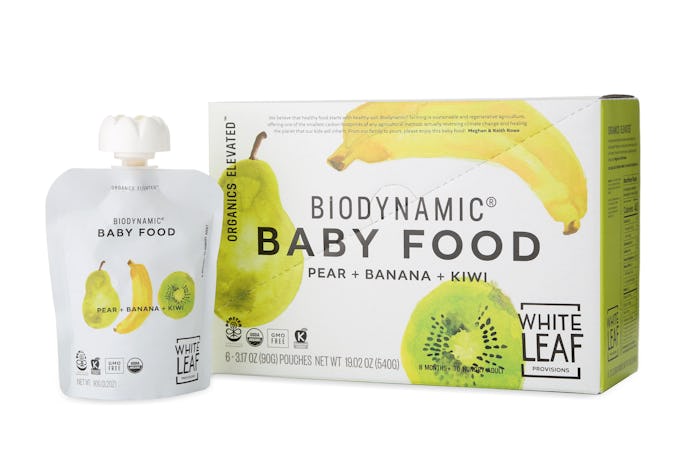Life
What Is Biodynamic Baby Food, Exactly? (Cause It's A Wee Bit Pricey)
Baby food has come a long way since the days when Gerber reigned supreme. If you want to go the all-natural, organic route, you're no longer forced to make your own mashes and purées; there's a plethora of pre-made baby food on the shelves that meets those standards and more. There's even a new company taking the green initiative one step further: biodynamic baby food. It sounds appealing, for sure... like something that would give your kid superpowers, but what exactly is biodynamic baby food?
For one thing, it has a lot more integrity than your average jar of strained peas — and I mean that literally. The practice of biodynamic farming is based on a "view of nature as an interconnected whole," as explained on the Demeter Association website. (The Demeter Association, Inc., is the United States’ representative of Demeter International, the largest certification organization for biodynamic agriculture.)
"Biodynamic farming involves managing a farm utilizing the principles of a living organism," the site continued. "A concise model of a living organism ideal would be a wilderness forest. In such a system there is a high degree of self-sufficiency in all realms of biological survival."
Far from new, modern biodynamic farming has its roots in techniques dating back nearly a century.
“Biodynamic farming is about healing the farm and soil by using holistic farming practices that were founded almost 100 years ago in Europe," Meghan Rowe, Co-Founder & CEO of White Leaf Provisions, tells Romper.
"This method builds nutrient-rich soil in which to grow nutrient-rich fruits and vegetables."
Rowe teamed up with her husband, Keith, to create White Leaf Provisions, a "family-run business bringing the first 100 percent regeneratively farmed, biodynamic, organic & GMO-free baby food line to market in the U.S."
"Biodynamic farmers aim to let Mother Nature take the lead in almost every aspect of the farm from seed to finished product. These farms are certified organic, completely GMO-free and use zero synthetic chemicals," Rowe explains, adding that chemicals are replaced with herbal sprays and natural compost.
The result are baby foods that are exceptionally pure and fresh, packaged in (of course) BPA-free pouches and cups. The White Leaf Organic Baby Food Blend pouches, for ages 6 months and up, come in four different flavors: Mango, Carrot, Banana & Pear; Apple, Sweet Potato & Beet; Pear, Banana & Kiwi; and Carrot, Sweet Potato, Pea. Prices range between $17.00 and $18.00 for a 6 pack, and can be purchased on Amazon or the White Leaf website.
Also available are two flavors of Biodyamic Applesauce: Apple & Pear, and Apple & Ceylon Cinnamon ($8 for four 4-ounce cups).
Expensive? A bit. If your baby goes through pouches and applesauce like, well, most babies go through pouches and applesauce, that price tag might very well give you pause. But if you have the means to add biodynamic items to your food budget, there are substantial benefits. Not only do biodynamic foods have more flavor, as Elizabeth Candelario, managing director at Demeter, told Shape, but they're even better for you: "They are deeply nutritious," Candelario said. The healthier the soil, the healthier the plants — and, following that logic, the healthier the body that's consuming those plants. Beyond the personal pros, you're also helping farmers and the planet itself when you buy biodynamic... so again, if you have the funds, these are purchases you can feel good about making.
If you don't? Hopefully, you will at some point. While not always easy to find, it's worth mentioning that organic food is slowly becoming somewhat more accessible; even WIC's organic baby food options are expanding, if only in a handful of states. As more and more companies and farms look to move in the direction of White Leaf, the eventual result could be that biodynamic foods are no longer a luxury. After all, shouldn't optimally nutritious food be the rule, rather than the exception?
